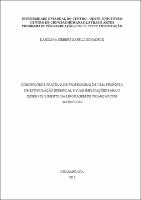| Compartilhamento |


|
Use este identificador para citar ou linkar para este item:
http://tede.unicentro.br:8080/jspui/handle/tede/354| Tipo do documento: | Dissertação |
| Título: | CONCEPÇÕES E PRÁTICAS DE PROFESSORAS DE UMA PROPOSTA DE ESTIMULAÇÃO ESSENCIAL E SUAS IMPLICAÇÕES PARA O DESENVOLVIMENTO DA LINGUAGEM DE CRIANÇAS COM DEFICIÊNCIA |
| Título(s) alternativo(s): | Concepts and practices of teachers of a proposed essential stimulation and its implications for the development of children with language disabilities |
| Autor: | Schadeck, Karolina Siebert Sapelli  |
| Primeiro orientador: | Oliveira, Jáima Pinheiro de |
| Resumo: | Atualmente é predominante em nossa sociedade, inclusive em contextos educacionais, o que Aranha (2001) denomina de Paradigma de Suporte. Isto significa que é preciso não apenas integrar a pessoa com deficiência aos aparatos sociais, mas também oferecer condições de suporte para que a mesma seja atendida em suas necessidades, tendo possibilidade de desenvolver plenamente suas capacidades físicas, cognitivas e emocionais. Sendo assim, é necessário que as intervenções junto a tais pessoas sejam iniciadas cada vez mais cedo, e a estimulação essencial, atendimento educacional especializado voltado a crianças entre zero e três anos e onze meses de idade, apresenta-se como uma das possibilidades de que isto aconteça. O objetivo geral da presente pesquisa foi identificar e descrever ações da estimulação essencial que podem favorecer o processo de aquisição e desenvolvimento da linguagem de crianças com deficiência, e os específicos foram caracterizar a proposta de estimulação essencial da APAE de uma cidade do interior do Paraná, incluindo seus objetivos, métodos e técnicas; e identificar concepções das professoras sobre a relação estimulação essencial - linguagem. Para a realização de tais objetivos, além da pesquisa bibliográfica e da revisão de literatura, foi realizada uma pesquisa de campo de caráter descritivo e exploratório em uma APAE de uma cidade do interior do Paraná. A pesquisa foi realizada por meio da análise do Projeto Político Pedagógico da escola, entrevista com as professoras e auxiliares que atuam na estimulação essencial e observação das aulas. Os resultados da pesquisa indicam que as intervenções voltadas ao desenvolvimento da linguagem das crianças atendidas ainda são escassas, e quando ocorrem são pontuais e pouco planejadas. Além disso, percebeu-se que os atendimentos ainda apresentam uma configuração mais clínica do que educacional. Também verifica-se uma expressiva separação entre ações voltadas ao cuidar e ao educar. Por fim, percebe-se que a estimulação essencial prioriza a função comunicativa da linguagem, e relativiza-se, nas práticas cotidianas, a importância desta habilidade para o desenvolvimento das demais funções psicológicas superiores. |
| Abstract: | Nowadays it is possible to notice that what prevails in educational contexts is, as called by Aranha (2001), a Paradigm Support. This means that we must not only provide the social apparatuses to people with disabilities , but we must also offer support conditions that attend their needs, so that they can fully develop their physical, cognitive and emotional capabilities. Therefore, it is necessary that interventions with these people are initiated earlier, and that the essential stimulation, which is a specialized educational service aimed tochildren between zero and three years and eleven months old, presents itself as one of the possibilities for this to happen. The overall objective of this research was to identify and describe the key actions with which stimulation may favor the acquisition and development of language in children with disabilities. The specific objectives were to characterize a proposal for essential stimulation of the APAE from an inland city of Paraná, including objectives, methods and techniques, besides to identify the teachers` conceptions about the relationship between essential stimulation - language. To attain these objectives, in addition to the literature review, a descriptive and exploratory field research was applied at an APAE from an inland city of Paraná. The research was conducted by analyzing the Political Pedagogical Project school, interviewing the teachers and assistants who work in essential stimulation and observing the classes. The results from this research indicate that interventions designed to develop children`s language are still scarce, and when they occur they are isolated and poorly planned. Moreover, it was noticed that the proposal is still a more clinical setting than educational. In addition, there is a significant separation between actions aimed to care for and educating. Finally, we notice that the essential stimulation prioritizes the communicative function of language, and are relativized in daily practice, the importance of this skill for the development of other higher mental functions. |
| Palavras-chave: | Educação Especial Estimulação Essencial Linguagem Special Education Essential Stimulation Language |
| Área(s) do CNPq: | CIENCIAS HUMANAS::EDUCACAO |
| Idioma: | por |
| País: | BR |
| Instituição: | UNICENTRO - Universidade Estadual do Centro Oeste |
| Sigla da instituição: | UNICENTRO |
| Departamento: | Unicentro::Departamento de Ciências Humanas, Letras e Artes |
| Programa: | Programa de Pós-Graduação em Educação (Mestrado - Irati) |
| Citação: | SCHADECK, Karolina Siebert Sapelli. CONCEPÇÕES E PRÁTICAS DE PROFESSORAS DE UMA PROPOSTA DE ESTIMULAÇÃO ESSENCIAL E SUAS IMPLICAÇÕES PARA O DESENVOLVIMENTO DA LINGUAGEM DE CRIANÇAS COM DEFICIÊNCIA. 2014. 181 f. Dissertação (Programa de Pós-Graduação em Educação - Mestrado - Irati) - Universidade Estadual do Centro Oeste, Guarapuava-PR. |
| Tipo de acesso: | Acesso Aberto |
| URI: | http://localhost:8080/tede/handle/tede/354 |
| Data de defesa: | 25-Abr-2014 |
| Aparece nas coleções: | Programa de Pós-Graduação em Educação (Mestrado - Irati) |
Arquivos associados a este item:
| Arquivo | Descrição | Tamanho | Formato | |
|---|---|---|---|---|
| PR KAROLINA SIEBERT SAPELLI SCHADECK.pdf | 1,16 MB | Adobe PDF |  Baixar/Abrir Pré-Visualizar |
Os itens no repositório estão protegidos por copyright, com todos os direitos reservados, salvo quando é indicado o contrário.




